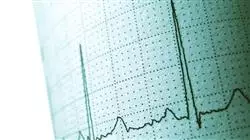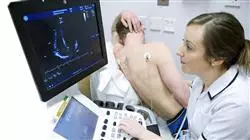University certificate
The world's largest faculty of medicine”
Introduction to the Program
This course focuses on the control of imaging techniques in the evaluation of ACS patients without ST-segment elevation and their long-term prognosis”

Nowadays, imaging techniques applicable in medical protocols are varied and very effective. As far as cardiac conditions are concerned, the development of echocardiography or magnetic resonance imaging has brought with it the possibility for specialists to make more complete diagnoses when, for example, a patient has suffered an Acute Coronary Syndrome. In addition, these techniques will also provide data on the patient's evolution, allowing the physician to measure the efficacy of the treatment.
TECH has compiled the most up-to-date information on this subject in a Postgraduate certificate. This program not only includes in its syllabus a section that delves into the usefulness of imaging techniques during the hospital phase and in the prognostic evaluation of the patient in the long term, but also delves into the emerging parameters that can be useful in this context. It also details the problem of patients with ischemic myocardial damage, but in whom there is no evidence of obstructive atherosclerotic coronary artery disease (MINOCA).
A program directed and designed by experts in cardiology in which the specialists will find not only the most cutting-edge content in the field, but also the most complete and varied complementary material of the moment with which to continue expanding their knowledge. In addition, the versatility provided by this online Postgraduate certificate will allow you to distribute the 150 hours of the program according to your own time availability.
TECH provides you with the best content, but you decide when to connect and from which electronic device. In addition, you will have at your disposal the syllabus from day one”
This Postgraduate certificate in Acute Evaluation of ACS Patients contains the most complete and up-to-date scientific program on the market. The most important features include:
- The development of practical cases presented by experts in cardiology
- The graphic, schematic, and practical contents with which they are created, provide scientific and practical information on the disciplines that are essential for professional practice
- Practical exercises where self-assessment can be used to improve learning
- Its special emphasis on innovative methodologies
- Theoretical lessons, questions to the expert, debate forums on controversial topics, and individual reflection assignments
- Content that is accessible from any fixed or portable electronic device with an Internet connection
The teaching team will guide you, through their own experience in cardiac medicine, so that you can get the most out of this Postgraduate certificate”
The program’s teaching staff includes professionals from sector who contribute their work experience to this educational program, as well as renowned specialists from leading societies and prestigious universities.
Its multimedia content, developed with the latest educational technology, will provide the professional with situated and contextual learning, i.e., a simulated environment that will provide an immersive education programmed to learn in real situations.
The design of this program focuses on Problem-Based Learning, by means of which the professionals must try to solve the different professional practice situations that are presented throughout the program. For this purpose, the student will be assisted by an innovative interactive video system created by renowned experts.
Learn about the latest developments related to the causes and prognosis of patients with MINOCA"

A 100% online program that delves, among other aspects, into the new techniques of myocardial deformation in ACS patients without ST-Segment Elevation"
Why study at TECH?
TECH is the world’s largest online university. With an impressive catalog of more than 14,000 university programs available in 11 languages, it is positioned as a leader in employability, with a 99% job placement rate. In addition, it relies on an enormous faculty of more than 6,000 professors of the highest international renown.

Study at the world's largest online university and guarantee your professional success. The future starts at TECH”
The world’s best online university according to FORBES
The prestigious Forbes magazine, specialized in business and finance, has highlighted TECH as “the world's best online university” This is what they have recently stated in an article in their digital edition in which they echo the success story of this institution, “thanks to the academic offer it provides, the selection of its teaching staff, and an innovative learning method aimed at educating the professionals of the future”
A revolutionary study method, a cutting-edge faculty and a practical focus: the key to TECH's success.
The most complete study plans on the university scene
TECH offers the most complete study plans on the university scene, with syllabuses that cover fundamental concepts and, at the same time, the main scientific advances in their specific scientific areas. In addition, these programs are continuously being updated to guarantee students the academic vanguard and the most in-demand professional skills. In this way, the university's qualifications provide its graduates with a significant advantage to propel their careers to success.
TECH offers the most comprehensive and intensive study plans on the current university scene.
A world-class teaching staff
TECH's teaching staff is made up of more than 6,000 professors with the highest international recognition. Professors, researchers and top executives of multinational companies, including Isaiah Covington, performance coach of the Boston Celtics; Magda Romanska, principal investigator at Harvard MetaLAB; Ignacio Wistumba, chairman of the department of translational molecular pathology at MD Anderson Cancer Center; and D.W. Pine, creative director of TIME magazine, among others.
Internationally renowned experts, specialized in different branches of Health, Technology, Communication and Business, form part of the TECH faculty.
A unique learning method
TECH is the first university to use Relearning in all its programs. It is the best online learning methodology, accredited with international teaching quality certifications, provided by prestigious educational agencies. In addition, this disruptive educational model is complemented with the “Case Method”, thereby setting up a unique online teaching strategy. Innovative teaching resources are also implemented, including detailed videos, infographics and interactive summaries.
TECH combines Relearning and the Case Method in all its university programs to guarantee excellent theoretical and practical learning, studying whenever and wherever you want.
The world's largest online university
TECH is the world’s largest online university. We are the largest educational institution, with the best and widest online educational catalog, one hundred percent online and covering the vast majority of areas of knowledge. We offer a large selection of our own degrees and accredited online undergraduate and postgraduate degrees. In total, more than 14,000 university degrees, in eleven different languages, make us the largest educational largest in the world.
TECH has the world's most extensive catalog of academic and official programs, available in more than 11 languages.
Google Premier Partner
The American technology giant has awarded TECH the Google Google Premier Partner badge. This award, which is only available to 3% of the world's companies, highlights the efficient, flexible and tailored experience that this university provides to students. The recognition as a Google Premier Partner not only accredits the maximum rigor, performance and investment in TECH's digital infrastructures, but also places this university as one of the world's leading technology companies.
Google has positioned TECH in the top 3% of the world's most important technology companies by awarding it its Google Premier Partner badge.
The official online university of the NBA
TECH is the official online university of the NBA. Thanks to our agreement with the biggest league in basketball, we offer our students exclusive university programs, as well as a wide variety of educational resources focused on the business of the league and other areas of the sports industry. Each program is made up of a uniquely designed syllabus and features exceptional guest hosts: professionals with a distinguished sports background who will offer their expertise on the most relevant topics.
TECH has been selected by the NBA, the world's top basketball league, as its official online university.
The top-rated university by its students
Students have positioned TECH as the world's top-rated university on the main review websites, with a highest rating of 4.9 out of 5, obtained from more than 1,000 reviews. These results consolidate TECH as the benchmark university institution at an international level, reflecting the excellence and positive impact of its educational model.” reflecting the excellence and positive impact of its educational model.”
TECH is the world’s top-rated university by its students.
Leaders in employability
TECH has managed to become the leading university in employability. 99% of its students obtain jobs in the academic field they have studied, within one year of completing any of the university's programs. A similar number achieve immediate career enhancement. All this thanks to a study methodology that bases its effectiveness on the acquisition of practical skills, which are absolutely necessary for professional development.
99% of TECH graduates find a job within a year of completing their studies.
Postgraduate Certificte in Acute Evaluation of ACS Patients
Acute coronary syndrome (ACS) is a medical emergency that requires prompt and accurate evaluation and treatment to reduce the risk of serious complications and improve patient outcomes. Acute evaluation of the ACS patient is typically performed in the emergency department and focuses on accurately diagnosing the cause of symptoms, assessing the patient's risk factors, and implementing immediate treatments.
From the educational field, the acute evaluation of the ACS patient is developed through the teaching of clinical skills for health care professionals. Medical students and emergency medical personnel learn to recognize and assess the symptoms and signs of ACS, as well as the difference between unstable angina and myocardial infarction.
The acute evaluation of the ACS patient includes performing an electrocardiogram (ECG) to determine if there are changes in heart rhythm and function, and performing laboratory tests to assess cardiac enzymes and heart muscle damage.
Other important clinical skills include administering thrombolytic therapy, anticoagulants, antiplatelet agents, analgesia and other necessary medical interventions. In addition, practitioners must conduct good communication with patients and their families to provide information about the diagnosis and treatment, and provide necessary emotional support.
From the educational field, acute assessment of the ACS patient is developed by teaching clinical skills in the diagnosis and treatment of the underlying cause of symptoms. Healthcare professionals learn to recognize the symptoms and signs of ACS, perform diagnostic tests, and administer medical therapies and other necessary treatments, as well as care and communication with the patient and family members. Acute evaluation of the ACS patient must be prompt and accurate to reduce the risk of serious complications and improve patient outcomes.







